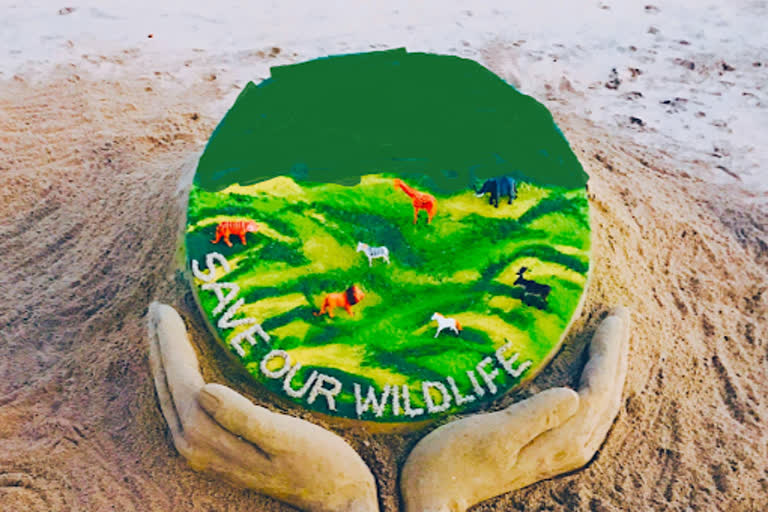Hyderabad: For millions of years, 'Mother' Earth has been nurturing to innumerable species, enabling them to enjoy their lifetime of the planet. Every creature has its own role to play and follows its predestined path. For human beings, they are like our close neighbours. However, we have forgotten to engage with our neighbours and have failed miserably to provide them with sustainable living conditions. In order to help us get back to the roots, the United Nations (UN)az has proclaimed May 22 as- 'International Day for Biological Diversity'. This year the UN has announced the theme as- 'Our solutions are in nature'.
-
Healthy ecosystems can help solve many of our challenges — from providing livelihoods, to improving food security & promoting human health.
— United Nations (@UN) May 21, 2020 " class="align-text-top noRightClick twitterSection" data="
More on Friday's #BiodiversityDay. https://t.co/C51jpP924w via @UNBiodiversity pic.twitter.com/tW0t6oj8zd
">Healthy ecosystems can help solve many of our challenges — from providing livelihoods, to improving food security & promoting human health.
— United Nations (@UN) May 21, 2020
More on Friday's #BiodiversityDay. https://t.co/C51jpP924w via @UNBiodiversity pic.twitter.com/tW0t6oj8zdHealthy ecosystems can help solve many of our challenges — from providing livelihoods, to improving food security & promoting human health.
— United Nations (@UN) May 21, 2020
More on Friday's #BiodiversityDay. https://t.co/C51jpP924w via @UNBiodiversity pic.twitter.com/tW0t6oj8zd
Biological diversity resources are the pillars upon which we build civilizations
Since human civilization exists, it totally depends on nature. From taking diet to using fuel, human beings are constantly dependant on nature. Construction, agriculture, food and beverages are the three largest industries that are most dependent on nature.
A developing country like India, which accounts for nearly 70 per cent of the rural population, they are totally dependant on agriculture to earn their livelihood. A study reveals, over 80 per cent of people living in rural areas in developing countries rely on traditional plant‐based medicines for basic healthcare.
2020 theme: Our solutions are in nature
The theme shows that people are part of nature rather than separate from nature, and emphasizes hope, solidarity and the importance of working together at all levels to build a future of life in harmony with nature.
Despite all our technological advances, we are completely dependent on healthy and vibrant ecosystems for our water, food, medicines, clothes, fuel, shelter and energy.
We lose 150 species every day
India- which is among the 17 mega biodiversity-rich countries, accounts for 8 per cent of the recorded species in the world.
The greatest concentration of biological diversity is found in the Himalayas, Andaman and Nicobar Islands and the Western Ghats regions. Unfortunately, we have lost almost 70 per cent of the species due to various pollution. The cheetah (Acinonyx Jubatus) and the pink-headed duck (Rhodonessa Caryophyllaceae) are amongst the few conspicuous ones everyone talks about.
According to a recent survey, the world is losing 100-150 species every day which means over 80,000 of species every year. Now, this is the alarming situation that has been created by humans for the last 100 years.
Protection of biodiversity: Need of the hour
The reason for the prevailing condition of nature is due to the intervention of human into the lives of thousands of creature. The loss of biodiversity threatens our food supplies, opportunities for recreation and tourism, and sources of wood, medicines, and energy. It also interferes with essential ecological functions. There is evidence to suggest that the loss of biodiversity could increase the number of cases of zoonosis, in other words, diseases transmitted from animals to humans.
In fact, 70% of emerging infectious diseases in recent years have stemmed from zoonosis. Since several species are often involved in the spread of infection, the loss of biodiversity and extinction of many of those species increases the chances of the pathogens reaching human beings.
Therefore, whilst the WHO asks us to prepare for possible unexpected scenarios, scientists insist that surrounding ourselves with healthy, functional and species-rich ecosystems would be best for humankind and for the stability of our planet.
Also Read: Korba forest department ropes in kumkis' to track wild elephant




